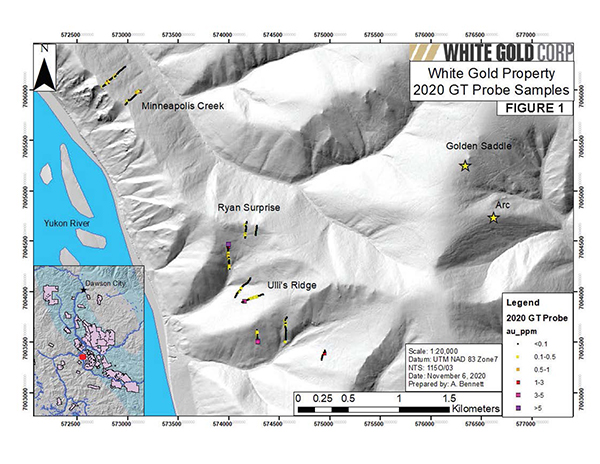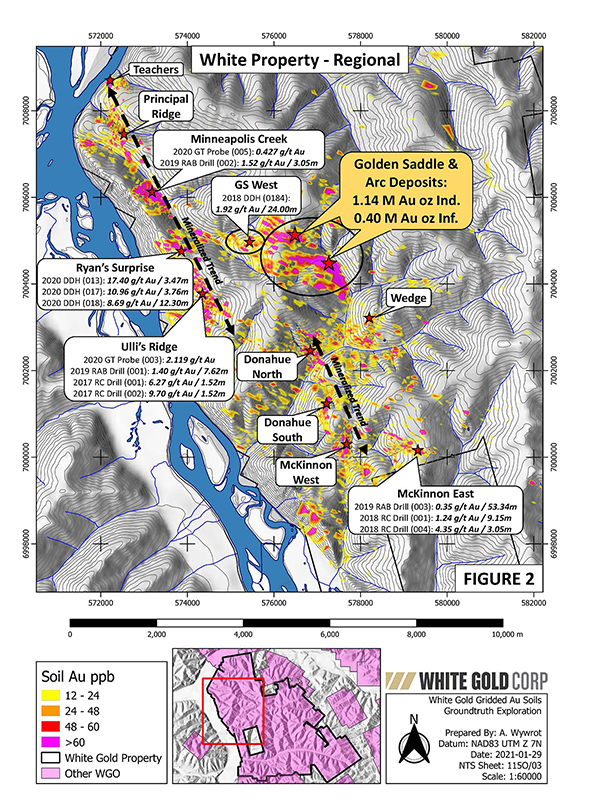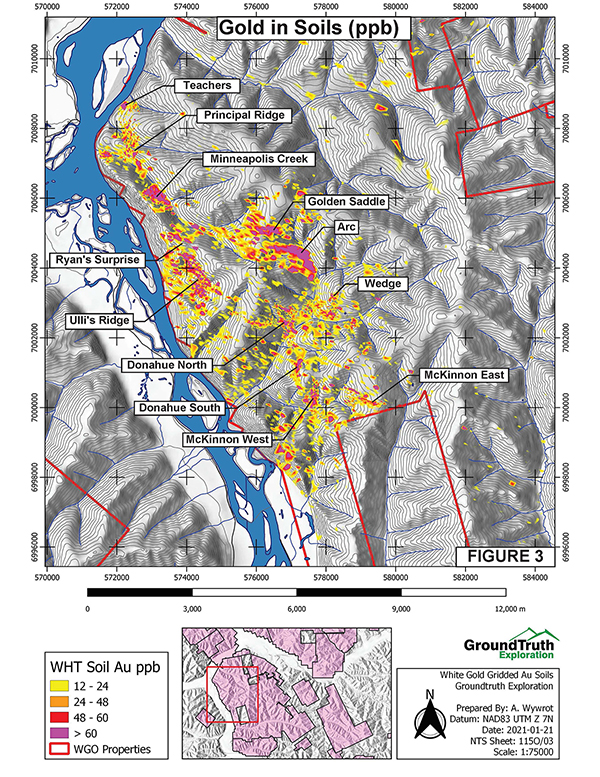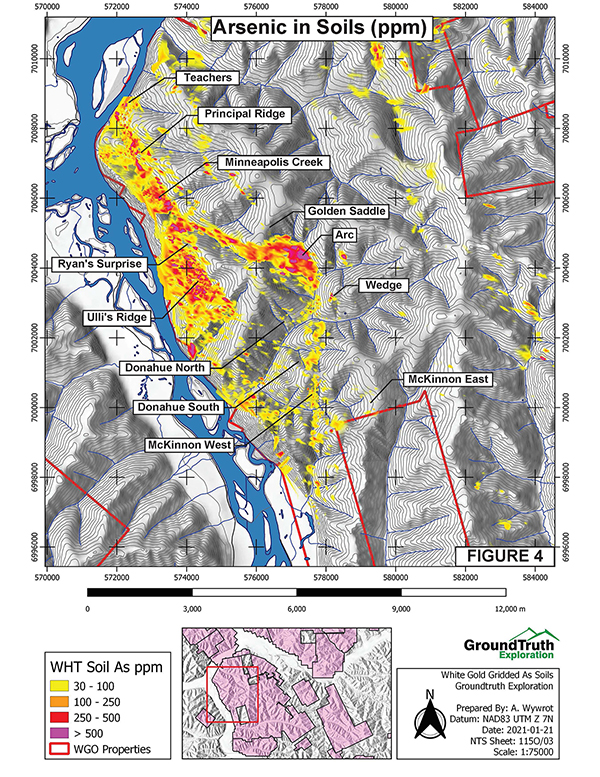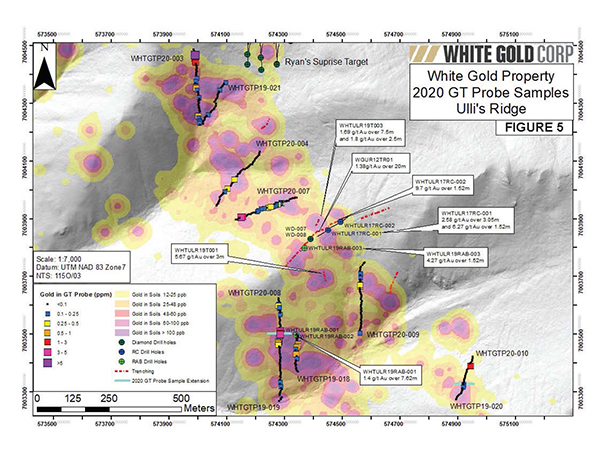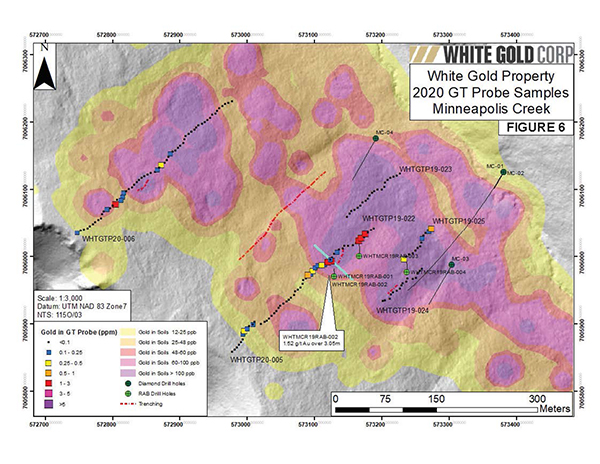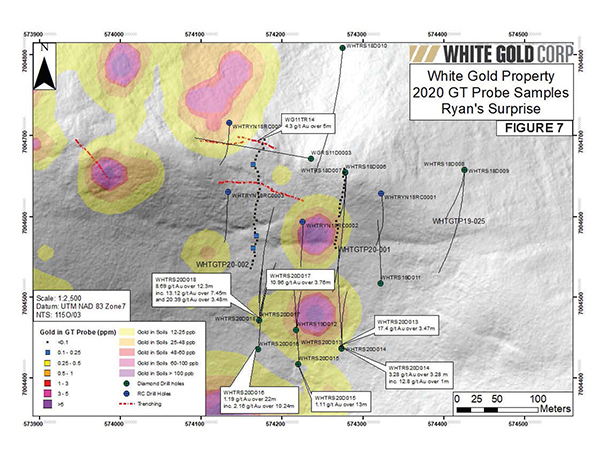White Gold Corp. Reports Significant GT Probe Results up to 8.52 g/t Gold at the Ulli’s Ridge Target Along Trend from The Ryan’s Surprise Discovery and 2.5km from the Company’s Flagship Golden Saddle Deposit
February 9, 2021
White Gold Corp. (TSX.V: WGO, OTC: WHGOF, FRA: 29W) (the “Company”) is pleased to announce significant results from 2020 GT Probe sampling on new targets located just west of its flagship Golden Saddle and Arc deposits containing a mineral resource of 1,139,900 ounces Indicated at 2.28 g/t Au and 402,100 ounces Inferred at 1.39 g/t Au on its White Gold property. This work forms part of the Company’s exploration program backed by strategic partners Agnico Eagle Mines Limited (TSX: AEM, NYSE: AEM) and Kinross Gold Corp (TSX: K, NYSE: KGC) on its extensive 420,000 hectare land package in the prolific White Gold District, Yukon, Canada.
Highlights Include:
- 10 GT Probe lines totalling 403 samples were completed on 3 separate targets – Ulli’s Ridge, Minneapolis Creek and Ryan’s Surprise located within a 6.5km long by 1.0km wide, north-south trend of anomalous soil geochemistry approx. 2.5km west of the Flagship Golden Saddle & Arc Deposits
- At Ulli’s Ridge, all 6 probe lines returned anomalous gold with the northern portion of line WHTGTP20-003 encountering a 25m wide zone (6 samples) averaging 2.119 g/t Au including 8.516 g/t Au approximately 200m west of Ryan’s Surprise, in an area that has not been previously tested by trenching or drilling.
- At Ulli’s Ridge the southern portion of line WHTGTP20-008 encountered a 10m wide zone (3 samples) that averaged 3.126 g/t Au including 4.6 g/t Au.
- At Minneapolis Creek, anomalous gold was returned from several zones including a 40m wide zone (9 samples) averaging 0.427 g/t Au on line WHTGTP20-005 and 20m wide zone (5 samples) averaging 0.392 g/t Au on line WHTGTP20-006.
- The 2020 GT Probe results continue to identify new targets for drill testing.
- Additional results from the 2020 exploration program will be announced in the coming weeks.
- View the 2021 VRIC Corporate Update interview with David D’Onofrio, CEO and Shawn Ryan, Chief Technical Advisor and other newly posted video updates and media at: https://whitegoldcorp.ca/media/videos/.
Figures accompanying this news release can be found at: http://whitegoldcorp.ca/investors/exploration-highlights/.
“We are very pleased with these GT Probe results which have identified exciting new drill targets near our existing flagship gold deposit. This work was a follow up to the 2019 success in identifying these and other new targets, which have already led to new drill discovery, such as the recent high grade diamond drill results on the Ryan’s Surprise. These results also further validate the effectiveness of our exploration methodologies, the large scale of the mineralized system that hosts our existing gold deposits, and the potential for additional new discoveries on this underexplored trend. We look forward to drilling these new targets” stated David D’Onofrio, CEO of the Company.
The GT Probe sampling was carried out in 3 target areas on the White Property including Ulli’s Ridge, Minneapolis Creek and Ryan’s Surprise for a total of 403 samples on 10 survey lines (Figure 1). Samples were collected at 5m spacings at depths ranging from 0.5m to 4.5m, with an average depth of 1.8m. Results are summarized below for each target area, and assay highlights are provided in Table 1. Information on the GT Probe and sampling technique is summarized below in “About GT Probe Sampling”.
Property-Scale Soil Geochemistry Trend on White Gold Property
The 3 targets tested by the 2020 GT Probe sampling program lie within a 6.5km long by 1.0km wide, north-south trend of anomalous soil geochemistry (Figure 2), extending from Ulli’s Ridge in the south to the Teacher’s showing in the north, which displays a strong Au-As association, with significant individual anomalies defined by values of greater than 45 ppb Au and 150 ppm As (Figures 3 & 4). This Au-As signature is similar to that displayed at the Arc deposit and the Ryan’s Surprise high grade gold discovery (See Company press release October 14, 2020). The Au-As trend forms part a larger anomalous geochemical footprint that measures approximately 11km north-south by up to 4.5 km wide that includes the Golden Saddle deposit and several additional zones including the Wedge, Donahue North and South, and McKinnon’s East and West, all of which are largely gold only anomalies.
GT Probe Results
At Ulli’s Ridge the combined 2019 and 2020 GT Probe sampling outlined multiple NW trending mineralized structures that are coincident with the anomalous Au-As soil geochemistry. To date trenching and drilling within this large anomaly is limited and has only partially tested two potential structures. Similar NW trending mineralized zones are indicated from 2019 and 2020 GT Probe sampling at Minneapolis Creek, where RAB drilling in 2019 suggested that the potential zone was not tested effectively due to soil creep. Testing at Ryan’s Surprise was designed to test the surface expression of gold mineralization encountered in diamond drilling. The results for both lines supports the current interpretation that mineralisation does not extend to surface on this target as the gold mineralization is capped by the hanging wall amphibolites and pyroxenites (i.e. the target hosts blind mineralization). This is significant as it highlights the additional potential for buried mineralization in untested areas elsewhere on the property where cap rocks may structurally overly mineralization, and surficial geochemistry anomalies are consequently absent.
Ulli’s Ridge
The Ulli’s Ridge target is located approximately 2.5km southwest of the Golden Saddle deposit and 1km south of the Ryan’s Surprise target. The area is underlain by metasedimentary rocks comprising interbedded metaquartzite and biotite-quartz-feldspar gneiss. Several interpreted structures cut through the area including a northwest-southeast trending thrust fault that marks the contact between the metasediments and overlying amphibolite.
Ulli’s Ridge is characterized by a large northwest-southeast trending coincident gold and arsenic soil anomaly measuring some 1,500m long by 600m wide with gold values up to 1585 ppb Au and arsenic values up to 2484 ppm As. Previous trenching and drilling at Ulli’s Ridge have encountered significant gold mineralization including 1.38 g/t Au over 20m in trench WGUR12TR01, 2.58 g/t Au over 3.05m and 6.27 g/t Au over 1.52m in hole WHTULR17RC-001, 9.70 g/t Au over 1.52m in hole WHTULR17RC-002, and 1.40 g/t Au over 7.62m in hole WHTULR19RAB-001.
Six GT Probe lines totalling 246 samples were completed at Ulli’s Ridge, with two lines being extensions of 2019 GT Probe sampling (Figure 5). Gold values range from 0.0025 to 8.516 g/t Au and arsenic values range from 8.5 – 5842.6 ppm As. The northern portion of line WHTGTP20-003 had 6 samples (25m wide) that averaged 2.119 g/t Au including a maximum value of 8.516 g/t Au. This zone occurs at the northwestern end of the large gold-in-soil anomaly approximately 200m west of Ryan’s Surprise, in an area that has not been previously tested by trenching or drilling. The central portion of probe line WHTGTP20-007 had 9 samples (40m wide) that averaged 0.212 g/t Au, and two additional samples near the western end of the line averaged 2.883 g/t Au. The southern portion of line WHTGTP20-008 had 3 samples (10m wide) that averaged 3.126 g/t Au with a maximum value of 4.603 g/t Au. RAB hole WHTUR19RAB-001 drilled approximately 60m east of this latter probe anomaly intersected 1.40 g/t Au over 7.62m from 24.4m depth.
Minneapolis Creek
The Minneapolis Creek target is located 3.5km west-northwest of the Golden Saddle deposit on a relatively steep east-facing slope. The geology is generally similar to Ulli’s Ridge with underlying metasedimentary rocks comprising interbedded metaquartzite and biotite-quartz-feldspar gneiss.
The target is associated with a large northwest-southeast trending coincident gold and arsenic soil anomaly measuring 900m long by 400m wide with gold values up to 1590 ppb Au and arsenic values up to 1658 ppm As. The soil anomaly appears to be terminated to the northwest by a northeast striking sinistral fault. Three of 4 RAB holes drilled in 2019 at Minneapolis Creek encountered anomalous gold (0.69 – 2.66 g/t Au) in the top 1.5m to 3.0m of the holes, confirming the surficial gold anomaly but suggesting that soil creep has occurred, and the holes may have been collared too far downslope to test the zone. Additionally, two of the RAB holes failed at shallow depths (< 26m) due to hole collapse in fault zones. Future drilling would be designed differently to properly accommodate for this to better test the target.
Two GT Probe lines totalling 102 samples were completed at Minneapolis Creek, with line WHTGTP20-005 being an extension of 2019 sampling (Figure 6). Gold values range from 0.009 - 1.714 g/t Au and arsenic values range from 40 – 1949 ppm As. The strongest probe results at Minneapolis Creek were at the northeastern end of line WHTGTP20-005 where 9 samples (40m wide) averaged 0.427 g/t Au including a maximum value of 1.714 g/t Au. On the southwest part of line WHTGTP20-006, 5 samples (20m wide) averaged 0.392 g/t Au with a maximum value of 1.320 g/t Au. Anomalous gold in the probe samples occur slightly upslope relative to the anomalous gold-in-soil values, implying that soil creep has occurred. Some anomalous probe gold values also occur at lower elevation along the survey lines, suggesting a second sub-parallel mineralized structure.
Ryan’s Surprise
The Ryan’s Surprise target is located approximately 2km west of the Golden Saddle deposit and 2km east of the Yukon River. The area is underlain by a footwall sequence of metaquartzites that are overlain by and in thrust contact with amphibolite and pyroxenite. Diamond drilling at Ryan’s Surprise in 2020 returned several significant high-grade gold intercepts including 17.4 g/t Au over 3.47m in hole WHTRS20D013, 10.96 g/t Au over 3.76m in hole WHTRS20D017, and 8.69 g/t Au over 12.3m in hole WHTRS20D018 (see Company News Release dated October 14, 2020). Gold mineralization is structurally controlled by brittle breccia and fracture zones with minor late quartz veining in metaquartzites along a 100m to 125m wide structural corridor. The gold mineralization has a strong association with anomalous arsenic, hydrothermal graphite and sooty pyrite.
At Ryan’s Surprise 2 GT Probe lines totalling 55 samples were completed (Figure 7). The lines were designed to test the surface expression of gold mineralization encountered in diamond drilling. Results for both lines are generally low as it appears that the gold mineralization is capped by the hanging wall amphibolites and pyroxenites and does not come to surface in this particular area (i.e. blind mineralization). This is significant as it highlights the potential for buried mineralization in untested areas elsewhere on the property where barren cap rocks may structurally overly mineralization, and surficial geochemistry anomalies are consequently absent.
Table 1. Highlights of 2020 GT Probe Sampling, White Gold Property.
| GT Probe Line ID | From | To | Width (1) | No. | Gold (g/t) | Arsenic (ppm) | ||
| (m) | (m) | (m) | Samples | Range | Average | Range | Average | |
| ULLI'S RIDGE | ||||||||
| WHTGTP20-003 | 20 | 45 | 25 | 6 | 0.031 - 8.516 | 2.119 | 166.8 - 5842.6 | 2265.3 |
| 130 | 135 | 5 | 2 | 0.510 - 0.751 | 0.631 | 887.5 - 1863.4 | 1375.5 | |
| WHTGTP20-004 | 130 | -- | -- | 1 | 0.462 | 0.462 | 261.2 | 261.2 |
| 170 | -- | -- | 1 | 0.361 | 0.361 | 1429.2 | 1429.2 | |
| WHTGTP20-007 | 55 | 95 | 40 | 9 | 0.122 - 0.391 | 0.212 | 491.6 - 1903.3 | 849.5 |
| 200 | 205 | 5 | 2 | 2.484 - 3.281 | 2.883 | 1465.8 - 3682.8 | 2574.3 | |
| WHTGTP20-008 (2) | 20 | 35 | 15 | 4 | 0.128 - 0.269 | 0.166 | 308.1 - 835.5 | 579.6 |
| 115 | 125 | 10 | 3 | 1.033 - 4.603 | 3.126 | 1439.8 - 3471.9 | 2432.3 | |
| WHTGTP20-009 | 75 | 85 | 10 | 3 | 0.229 - 0.372 | 0.321 | 651.2 - 1989.9 | 1263.9 |
| WHTGTP20-010(2) | 65 | -- | -- | 1 | 1.196 | 1.196 | 4025.1 | 4025.1 |
| MINNEAPOLIS CREEK | ||||||||
| WHTGTP20-005 (2) | 30 | 40 | 10 | 3 | 0.168 - 0.430 | 0.261 | 367.4 - 399.3 | 385.5 |
| 160 | 200 | 40 | 9 | 0.146 - 1.714 | 0.427 | 247.8 - 1949.0 | 608.7 | |
| WHTGTP20-006 | 70 | 90 | 20 | 5 | 0.099 - 1.320 | 0.392 | 297.6 - 704.7 | 425.5 |
| 150 | 160 | 10 | 3 | 0.088 - 0.358 | 0.201 | 275.1 - 582.6 | 445.0 | |
| RYAN'S SURPRISE | ||||||||
| WHTGTP20-002 | 35 | -- | -- | 1 | 0.136 | 0.136 | 473.0 | 473.0 |
| 125 | -- | -- | 1 | 0.109 | 0.109 | 62.3 | 62.3 | |
| 140 | -- | -- | 1 | 0.123 | 0.123 | 717.0 | 717.0 | |
Notes:
(1) GT Probe samples are point samples and tabulated results are meant only to provide the range and average of values over a given line interval. Results should not be interpreted to represent grade over width.
(2) Extension of 2019 GT Probe Sampling.
QA/QC
Analytical work for the 2020 GT Probe sampling program on the White Gold property was performed by Bureau Veritas Canada Ltd., an internationally recognized analytical services provider, at its Vancouver, British Columbia laboratory. Sample preparation was completed in two stages: crushing to a reject was carried out at its Whitehorse, Yukon facility, after which a 250 gram split was sent to the Vancouver, BC facility for pulverization and analysis. All probe samples were prepared using procedure PRP70-250 (crush 70% less than 2mm, riffle split off 250g, pulverize split to better than 85% passing 75 microns) and analyzed by methods FA430 (30g fire assay with AAS finish) and AQ-201 (15g, aqua regia digestion and ICP-ES/MS analysis). Samples containing >10 g/t Au were reanalyzed using method FA530 (30g Fire Assay with gravimetric finish).
About GT Probe Sampling
The GT Probe is a rubber track-mounted direct push probe designed to drive a cased hole through the soil profile to the bedrock interface with samples collected from the final 30cm of the hole. Samples are analyzed by portable XRF on site providing real time data and are then sent to commercial analytical laboratories for analysis of gold and multi-elements. The GT Probe is used as a cost-effective intermediate step between soil sampling and drilling, providing similar data to traditional trenching but with minimal environment impact and more representative sampling. Sample spacing along probe lines is dependent on the target type, but normally ranges between 2.5m and 10m, with 5m spacing being most common. The GT Probe is designed to operate in challenging terrane and is ideally suited for the White Gold District, Yukon. Additional information, including technical specifications of the GT Probe, can be found at: https://www.groundtruthexploration.com/services/drilling-trenching/.
About White Gold Corp.
The Company owns a portfolio of 21,207 quartz claims across 32 properties covering over 420,000 hectares representing over 40% of the Yukon’s prolific White Gold District. The Company’s flagship White Gold property hosts the Company’s Golden Saddle and Arc deposits which have a mineral resource of 1,139,900 ounces Indicated at 2.28 g/t Au and 402,100 ounces Inferred at 1.39 g/t Au(1). Mineralization on the Golden Saddle and Arc is also known to extend beyond the limits of the current resource estimate. The Company’s recently acquired VG Deposit also hosts a historic Inferred gold resource of 230,000 ounces at 1.65 g/t Au(2). Regional exploration work has also produced several other new discoveries and prospective targets on the Company’s claim packages which border sizable gold discoveries including the Coffee project owned by Newmont Corporation with Measured and Indicated Resources of 2.17 Moz at 1.46 g/t Au, and Inferred Resources of 0.50 Moz at 1.32 g/t Au(3), and Western Copper and Gold Corporation’s Casino project which has Measured and Indicated Resources of 14.5 Moz Au and 7.6 Blb Cu and Inferred Resources of 6.6 Moz Au and 3.3 Blb Cu(4). For more information visit www.whitegoldcorp.ca.
(1) See White Gold Corp. technical report titled “Technical Report for the White Gold Project, Dawson Range, Yukon Canada”, dated July 10, 2020, prepared by Dr. Gilles Arseneau, P.Geo., and Andrew Hamilton, P.Geo., available on SEDAR.
(2) See Comstock Metals Ltd. technical report titled “NI 43-101 TECHNICAL REPORT on the QV PROJECT”, dated August 19, 2014, prepared by Jean Pautler, P.Geo., and Ali Shahkar, P.Eng., available on SEDAR.
(3) See Newmont Corporation press release titled “Newmont Reports 2019 Gold Mineral Reserves of 100 Million Ounces, Largest in Company History”, dated February 13, 2020, available on SEDAR.
(4) See Western Copper and Gold Corporation press release titled “Western Copper and Gold Announces Significant Resource Increase at Casino”, dated July 14, 2020, available on SEDAR.
Qualified Person
Terry Brace, P.Geo. and Vice President of Exploration for the Company is a “qualified person” as defined under National Instrument 43-101 – Standards of Disclosure of Mineral Projects and has reviewed and approved the content of this news release.
Cautionary Note Regarding Forward Looking Information
This news release contains "forward-looking information" and "forward-looking statements" (collectively, "forward-looking statements") within the meaning of the applicable Canadian securities legislation. All statements, other than statements of historical fact, are forward-looking statements and are based on expectations, estimates and projections as at the date of this news release. Any statement that involves discussions with respect to predictions, expectations, beliefs, plans, projections, objectives, assumptions, future events or performance (often but not always using phrases such as "expects", or "does not expect", "is expected", "anticipates" or "does not anticipate", "plans", “proposed”, "budget", "scheduled", "forecasts", "estimates", "believes" or "intends" or variations of such words and phrases or stating that certain actions, events or results "may" or "could", "would", "might" or "will" be taken to occur or be achieved) are not statements of historical fact and may be forward-looking statements. In this news release, forward-looking statements relate, among other things, the Company’s objectives, goals and exploration activities conducted and proposed to be conducted at the Company’s properties; future growth potential of the Company, including whether any proposed exploration programs at any of the Company’s properties will be successful; exploration results; and future exploration plans and costs and financing availability.
These forward-looking statements are based on reasonable assumptions and estimates of management of the Company at the time such statements were made. Actual future results may differ materially as forward-looking statements involve known and unknown risks, uncertainties and other factors which may cause the actual results, performance or achievements of the Company to materially differ from any future results, performance or achievements expressed or implied by such forward-looking statements. Such factors, among other things, include:
the expected benefits to the Company relating to the exploration conducted and proposed to be conducted at the White Gold properties; the receipt of all applicable regulatory approvals for the Offering; failure to identify any additional mineral resources or significant mineralization; the preliminary nature of metallurgical test results; uncertainties relating to the availability and costs of financing needed in the future, including to fund any exploration programs on the Company’s properties; business integration risks; fluctuations in general macroeconomic conditions; fluctuations in securities markets; fluctuations in spot and forward prices of gold, silver, base metals or certain other commodities; fluctuations in currency markets (such as the Canadian dollar to United States dollar exchange rate); change in national and local government, legislation, taxation, controls, regulations and political or economic developments; risks and hazards associated with the business of mineral exploration, development and mining (including environmental hazards, industrial accidents, unusual or unexpected formations pressures, cave-ins and flooding); inability to obtain adequate insurance to cover risks and hazards; the presence of laws and regulations that may impose restrictions on mining and mineral exploration; employee relations; relationships with and claims by local communities and indigenous populations; availability of increasing costs associated with mining inputs and labour; the speculative nature of mineral exploration and development (including the risks of obtaining necessary licenses, permits and approvals from government authorities); the unlikelihood that properties that are explored are ultimately developed into producing mines; geological factors; actual results of current and future exploration; changes in project parameters as plans continue to be evaluated; soil sampling results being preliminary in nature and are not conclusive evidence of the likelihood of a mineral deposit; title to properties; ongoing uncertainties relating to the COVID-19 pandemic; and those factors described under the heading "Risks Factors" in the Company's annual information form dated July 29, 2020 available on SEDAR. Although the forward-looking statements contained in this news release are based upon what management of the Company believes, or believed at the time, to be reasonable assumptions, the Company cannot assure shareholders that actual results will be consistent with such forward-looking statements, as there may be other factors that cause results not to be as anticipated, estimated or intended. Accordingly, readers should not place undue reliance on forward-looking statements and information. There can be no assurance that forward-looking information, or the material factors or assumptions used to develop such forward-looking information, will prove to be accurate. The Company does not undertake to release publicly any revisions for updating any voluntary forward-looking statements, except as required by applicable securities law.
Neither the TSXV nor its Regulation Services Provider (as that term is defined in the policies of the TSXV) accepts responsibility for the adequacy or accuracy of this news release.
Contact Information:
David D’Onofrio
Chief Executive Officer
White Gold Corp.
(647) 930-1880
ir@whitegoldcorp.ca


